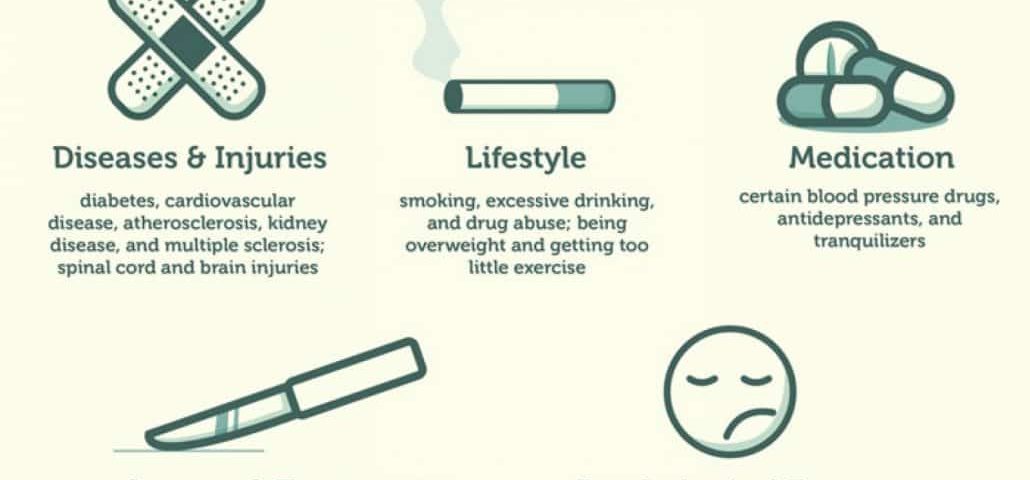- Due to covid-19 only online consultation is available. Write at this email to consult your trusted doctor, Dr. Sharmila Majumdar
- mili77@gmail.com
Erectile Dysfunction – Treatment at Sexual & Mental Health Clinic

What is the difference between pleasure and happiness?
November 8, 2017
Relationship Between Hypertension & Erectile Dysfunction
November 22, 2017If you’re concerned about erectile dysfunction, talk to your Sexologist — even if you’re embarrassed. Sometimes, treating an underlying condition is enough to reverse erectile dysfunction. In other cases, medications or other direct treatments might be needed.
Symptoms
Erectile dysfunction symptoms might include persistent:
- Trouble getting an erection
- Trouble keeping an erection
- Reduced sexual desire
See your Sexologist if:
- You have concerns about your erections or you’re experiencing other sexual problems such as premature or delayed ejaculation, low libido, and problem with orgasm.
- You have diabetes, heart disease or another known health condition that might be linked to erectile dysfunction.
You have other symptoms along with erectile dysfunction. Male sexual arousal is a complex process that involves the brain, hormones, emotions, nerves, muscles and blood vessels. Erectile dysfunction can result from a problem with any of these. Likewise, stress and mental health concerns can cause or worsen erectile dysfunction. Sometimes a combination of physical and psychological issues causes erectile dysfunction. For instance, a minor physical condition that slows your sexual response might cause anxiety about maintaining an erection. The resulting anxiety can lead to or worsen erectile dysfunction.
Physical causes of erectile dysfunction:
In many cases, erectile dysfunction is caused by something physical. Common causes include:
- Heart disease
- Clogged blood vessels (atherosclerosis)
- High cholesterol
- High blood pressure
- Diabetes
- Obesity
- Metabolic syndrome — a condition involving increased blood pressure, high insulin levels, body fat around the waist and high cholesterol
- Parkinson’s disease
- Multiple sclerosis
- Certain prescription medications
- Tobacco use
- Peyronie’s disease — development of scar tissue inside the penis
- Alcoholism and other forms of substance abuse
- Sleep disorders
- Treatments for prostate cancer or enlarged prostate
- Surgeries or injuries that affect the pelvic area or spinal cord
Psychological causes of erectile dysfunction:
The brain plays a key role in triggering the series of physical events that cause an erection, starting with feelings of sexual excitement. A number of things can interfere with sexual feelings and cause or worsen erectile dysfunction. These include:
- Depression, anxiety or other mental health conditions
- Stress
- Relationship problems due to stress, poor communication or other concerns.
Risk factors:
As you get older, erections might take longer to develop and might not be as firm. You might need more direct touch to your penis to get and keep an erection.
Various risk factors can contribute to erectile dysfunction, including:
- Medical conditions, particularly diabetes or heart conditions
- Tobacco use, which restricts blood flow to veins and arteries, can — over time — cause chronic health conditions that lead to erectile dysfunction
- Being overweight, especially if you’re obese
- Certain medical treatments, such as prostate surgery or radiation treatment for cancer
- Injuries, particularly if they damage the nerves or arteries that control erections
- Medications, including antidepressants, antihistamines and medications to treat high blood pressure, pain or prostate conditions
- Psychological conditions, such as stress, anxiety or depression, etc. can cause low libido
- Drug and alcohol use, especially if you’re a long-term drug user or heavy drinker
Complications:
Complications resulting from erectile dysfunction can include:
- An unsatisfactory sex life
- Stress or anxiety
- Embarrassment or low self-esteem
- Relationship problems
- The inability to get your partner pregnant
Prevention:
The best way to prevent erectile dysfunction is to see your sexual medicine specialist at the earliest the moment you detect a problem, when it’s an acute problem, but postponing a treatment may make it chronic. Also make healthy lifestyle choices and to manage any existing health conditions.
Lifestyle :
For many men, erectile dysfunction is caused or worsened by lifestyle choices. Here are some steps that might help:
- If you smoke, quit.
- Lose excess pounds. Being overweight can cause — or worsen — erectile dysfunction
- Include physical activity in your daily routine. Exercise can help with underlying conditions that play a part in erectile dysfunction in a number of ways, including reducing stress, helping you lose weight and increasing blood flow.
- Get treatment for alcohol or drug problems. Drinking too much or taking certain illegal drugs can worsen erectile dysfunction directly or by causing long-term health problems.
- Work through relationship issues. Consider couples counseling if you’re having trouble improving communication with your partner or working through problems on your own
- Involve your sexual partner. Your partner might see your inability to have an erection as a sign of diminished sexual interest. Your reassurance that this isn’t the case can help. Communicate openly and honestly about your condition. Treatment is often more successful when a man involves his partner along with the doctor.
- Don’t ignore stress, anxiety or other mental health concerns. Talk to your doctor or consult a mental health provider to address these issues.
Having a healthy sexual life is an indicator of your heart functioning well too, so do not ignore an important part of your health. Poor sexual function deteriorates the quality of life and immune system.
See a qualified Sexologist without delay in the best your own interest of your health and lead a fulfilling life.
For appointments to see our Chief Sexologist & Psychoanalyst, Dr. Sharmila Majumdar please visit Make an Appointment

